About Defect Prosthetics
Our Approach
Restore a reliable bite for a fuller life!

When a tooth is missing or has to be extracted, the treatment is called a missing tooth prosthesis. Although there is no substitute for natural teeth, advances in dentistry have led to the development of a variety of treatment methods, including dentures, bridges, implants, and tooth grafts. The clinic offers a wide variety of missing tooth prosthetics to meet the symptoms and needs of patients.
The director has extensive experience in providing dental care for the elderly, including home visits and institutional care. He has extensive experience in providing oral care for patients who are bedridden or hospitalized for long periods of time. We would like to provide the best treatment for patients who have lost their teeth, and we would like to provide the best treatment according to their stage of life.
Features of our clinic
We provide treatment that is in line with your wishes and sympathetic to your feelings.

If you have lost a tooth, you may feel that there is no way to recover from the damage. First of all, please feel free to talk to us about your painful feelings. Then, please tell us your wishes such as “I want to be able to chew hard food again,” “I don’t want to see the metal fittings,” “I want to have a youthful looking mouth,” and so on.
We cannot replace lost teeth, but we can restore a comfortable chewing experience and a full diet. Let us work together with you to find a treatment method that meets your oral health, lifestyle, and desires. We will make suggestions that are close to your heart.
If a missing tooth is left untreated, it will deteriorate other teeth as well!
When a tooth falls out, people often leave it as it is because “it doesn’t hurt” or “I can chew with my other teeth. However, if even one tooth falls out, the balance of the bite is lost, the teeth next to the missing tooth fall in, and other teeth are easily damaged.
In addition, tooth loss must be caused by decay or periodontal disease to begin with. If it is left untreated, the risk of other teeth falling out increases as well. It is important to determine the original cause of tooth loss, provide the necessary treatment, and protect other teeth. At our office, we will provide you with a comprehensive assessment of your oral problems and then suggest appropriate treatment options.
We offer a variety of options to suit your condition and age
Partial dentures and dentures
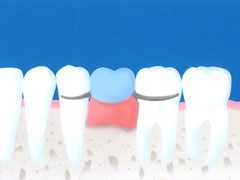
- Removable and easy to care for
- Can be expected to provide a firm bite
- Easy to care for as you age
- Many types of dentures are available, from those that are covered by insurance to those that are selffunded.
Dental implants
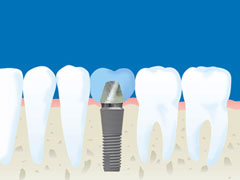
- Recommended for relatively young people
- Restore a firm and comfortable bite
- No damage to other teeth
- Requires implantation surgery
- Requires certain conditions such as bone and gum condition
- Requires maintenance → difficult to care for in old age
Bridge
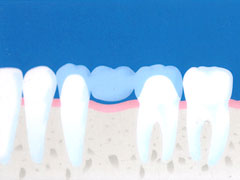
- Easy to restore chewing comfort
- Since both adjacent teeth are shaved and covered, it is easy to damage the teeth on both sides.
Tooth graft
- Wisdom teeth are removed and transplanted.
- Biting comfort similar to natural teeth can be obtained.
- Applicable cases are limited.
About Dentures
Our Philosophy
We have specialized in dentures as a solution for missing restorations.

The Director has studied dentures because he believes that the treatment of complete dentures is the fundamental treatment of dentistry. He believes that dentures are the culmination of dental treatment, where the ideal shape is created from a state of no teeth to one where everything is in balance with the bite and harmony with the mucosa, and that this is filled with know-how that can be applied to other dental treatments.
Above all, to restore the joy of eating
For patients, dentures are a means of restoring the joy of chewing and eating, and also a means of restoring health by eating well. Of course, a natural and beautiful mouth can also bring back the pleasure of speaking, singing, and putting on makeup. By combining the knowledge and treatment techniques we have learned so far, we hope to provide denture treatment that will help you lead a full and healthy life.
Features of our clinic
We create highly stable dentures by considering the balance of forces from various angles.
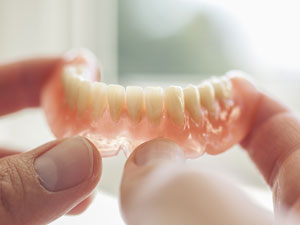
Denture TreatmentFirm and stable partial dentures require three forces: support, grasp, and maintenance. Support is the force that resists vertical sinking, retention is the force that resists horizontal swaying, and maintenance is the force that resists detachment. Only by comprehensively balancing these three forces can a firm bite be achieved.
Also, if the gums of the teeth supporting the dentures have periodontal disease, the dentures will not be stable, so it is necessary to consider the overall condition of the teeth. Our dentures are characterized by their overall balance, and by making good use of healthy teeth, they provide a firm and comfortable bite and can be used for a long time. If you are looking for new dentures or are not satisfied with your existing dentures, please contact us.
Take your time to adjust with temporary dentures [Blanching Technique].

The “branching technique” is a method of creating ideal dentures through repeated trial and error by having the patient wear temporary dentures to check the fit and comfort.
By trial and error with the temporary dentures, the dentist checks the fit and comfort of the dentures, and fine-tunes the dentures to achieve the final shape. Through close cooperation between the dentist and the technician, we are able to provide dentures that are both functionally and esthetically superior.
Perfectly Fitted Full Dentures
For full dentures, documentation and molding of the bite is even more important. The molding process is closely related to the shape of the mucosa and the movement of the muscles, so we use temporary dentures to adjust them to a comfortable fit before taking the molds. Further adjustments are made by recording the bite and the functional movement of the jaw, and the bite is further adjusted after the final dentures are placed to achieve the ideal fit.
Partial dentures that also protect other teeth [Cast Partial Dentures].
This is a partial denture that looks like a combination of a cover and denture. Partial dentures are secured to the remaining teeth with a clasp (metal spring), but our dentures are designed to include the natural teeth on which the clasp rests (mouth preparation), so they do not place a heavy burden on the remaining teeth. The entire denture design distributes the force so that the force is not applied to any particular part of the denture and the denture remains stable and in harmony with the rest of the denture in the long term.
Choose the one that best fits your needs and lifestyle
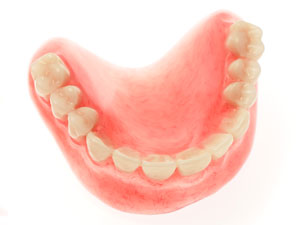
There are many types of insurance dentures, including partial and full dentures. We offer a variety of dentures to suit your symptoms and needs, so please feel free to contact us for more information.
We also offer dentures for insurance treatment
Dentures made under the insurance system have detailed restrictions on materials, design, and structure. Self-financing dentures are superior in terms of esthetics such as appearance, fit, and the ability to transmit food temperature. Please contact us for an easy-to-understand explanation while comparing various types of dentures.
About Implants
Our philosophy
We emphasize highly accurate diagnosis and treatment planning.
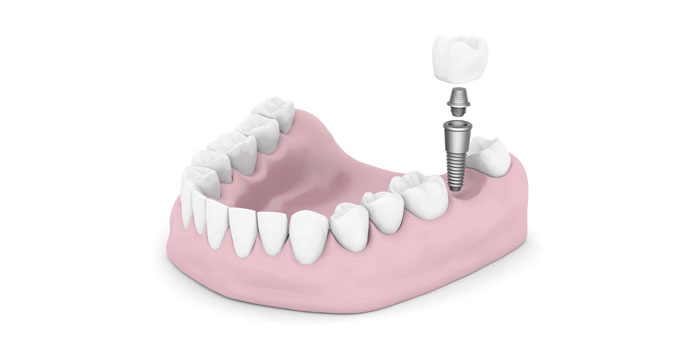
Implant is a treatment method in which an artificial tooth root made of titanium is implanted in the jawbone and an artificial tooth is attached to it as a foundation. Titanium has the property of bonding with bone and has good biocompatibility, making it a gentle material for the body. Since no other teeth are cut down, this treatment method does not place a burden on the patient and provides a beautiful appearance and a bite similar to that of natural teeth.
However, there are various conditions that need to be considered for implants, such as the fact that they depend on the condition of the jaw in which the tooth root is implanted, and the fact that they require an environment that allows for regular maintenance and proper management after treatment. We offer a thorough consultation and compare the advantages and disadvantages of dental implants, bridges, and dentures, as well as implants, and make treatment recommendations based on the patient’s individual oral condition, needs, lifestyle, and budget.
Features of our clinic
Ideal top-down treatment
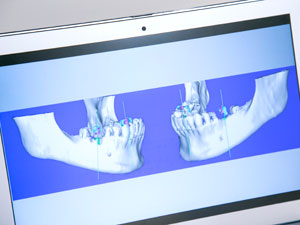
Top-Down Treatment Our implant treatment is based on the concept of top-down treatment. Top-down treatment is a method in which the patient envisions what he or she wants the final implant to look like, and then works backwards from there.
Based on the 3D data from CT imaging of the inside of the jawbone, an ideal bite is created, and a highly accurate computer guide is used to accurately simulate the treatment plan, including the placement location and angle of the implants. This system enables us to place implants in the correct position in a short time, which makes it possible to safely perform highly accurate treatment with less burden on the patient.
We place the highest priority on safety above all else in implant treatment.
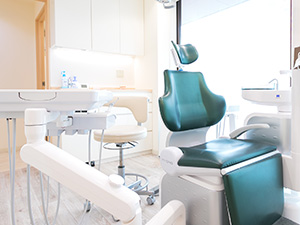
Implant TreatmentWe use implants made by highly reliable and proven manufacturers, and we take all possible infection control measures in consideration of the environment. We are committed to providing implant treatment with an emphasis on safety and peace of mind.
Advantages/Disadvantages of Implant Treatment
Advantages
- Appearance is similar to natural teeth.
- Because the tooth root is implanted directly into the jawbone, you can chew with a sensation similar to that of your own teeth.
- More natural looking and easier to pronounce than dentures or bridges
- No need to remove adjacent teeth as with bridges
- No springs are used, so there is no burden on other teeth.
- Easier to brush and care for, and no bad breath as with dentures
Disadvantages
- Requires surgery
Surgery is required to place implants. In addition, more precise coverings and higher quality materials are usually required, so the treatment cost is relatively high if surgery is included. - Long treatment time
The minimum treatment time is four to six months. It may take more than one year if the number of implants is large or if bone augmentation is also performed. - In some cases, treatment may not be possible.
Unfortunately, there are cases in which implants are not indicated due to the condition of the gums and mouth, or systemic diseases such as diabetes.
Frequently Asked Questions
インプラントに関する質問~手術に関して
手術は痛いですか?
インプラントの手術では、局部麻酔をかけますので痛みはありません。当院では、最新の技術で痛みの少ない治療を行っております。
インプラント治療は大変ですか?
以前のインプラントをご存知の方は「大変な手術をして入れるもの」というイメージをお持ちの方もいらっしゃると思います。しかしここ十数年で素材や形態・埋入方法が改良され、以前よりも簡単に処置できるようになりました。
最近では、素材がよく処置が以前に比べて簡潔になったことから、インプラントの件数も増えてきました。また、長期的に機能することもわかってきました。
しかし一方で、やはりケアの重要性と適応症例の幅が問題となっております。まずは、全身疾患がなく喫煙されていない方が条件となります。喫煙者は予後が悪く、数年しか持たないケースが多く報告されております。
手術時間はどのくらいかかりますか?
1~3本ぐらいであれば、1時間から1時間半ぐらいで終わります。骨を作るといった複雑な手術になると、もう少し時間がかかります。
手術中はずっと口を開けていなくてはなりませんか?
器具の取り替え時など、患者さんがお口を楽にする時間を設けておりますので、どうぞご安心ください。
治療期間はどのくらいですか?
早い方なら2か月程度で正常に噛めるようになります。ただし、患者さんの食いしばりや歯ぎしりなどにより、多少延びる場合もございます。
また、歯周病治療直後のインプラント埋入など、手術のリスクが高かった場合は少し様子を見る必要があるため、さらに数か月かかります。
手術後の入院は必要ですか?
入院は必要ありません。念のため手術後は安静にしていただくように説明しておりますが、デスクワークなどのお仕事は差し支えないでしょう。
インプラントに関する質問~治療後に関して
食べ物で気をつけるものはありますか?
堅い物を噛むと歯が割れることがあるように、あまりにも堅い物は避けた方がよいでしょう。普通に食べられる物であれば問題ないと思います。
インプラントが歯周病になったらどうしますか?
軽度の場合は歯周病の治療を行います。重度の場合は手術が必要です。場合によっては抜くしかできないこともあります。とはいえ、定期検診に通うことで歯周病の予防ができます。
手術後、腫れたりしませんか?
患者さんによっては外科的刺激が大きくなり少し腫れることもありますが、それ自体は手術に対しての当然の反応なので心配はありません。多くの方は3~4日後に腫れがピークとなり、約1週間経てば完全に収まります。
手術後の運動は大丈夫ですか?
できるだけ運動は避けてください。体が温まると血流が盛んになり、痛みが出たり出血したりする原因となります。また体が疲れると抵抗力がなくなり、治りも悪くなります。
手術後の食事は大丈夫ですか?
ほとんどの場合、術後3~4時間ぐらいで麻酔が切れます。しびれが切れれば食事をしても大丈夫です。ただ、できるだけ手術をしていない箇所で食べ物を噛んでください。また、できれば柔らかい物をお召し上がりください。栄養を摂れば抵抗力がつきますので、治癒も早まります。
定期的な検診は必要ですか?
インプラントはチタンのため虫歯にはなりませんが、歯周病にはなります。また歯周病になると非常に進行が早いため、予防するために定期的なクリーニングが必要です。
手術後に注意することはありますか?
手術当日は、激しい運動、入浴(長湯しなければシャワー等は問題ありません)、飲酒も避けてください。また感染を防ぐため、出された薬をきちんと飲んでください。うがい薬は手術翌日から使い、患部を清潔に保ってください。
インプラントはどのくらいもちますか?
患者さんのお口の中の衛生管理に大きく関係してきます。お口の衛生状態が悪いと、インプラントの寿命が短くなる場合もあります。
インプラントの歴史は1950年から始まり、実用化されたのは1965年からです。1965年にインプラントを行った患者さんが亡くなるまでの41年間、問題なく機能していたという実例があります。
つまり40年間耐えられる実績は証明されております。常に衛生状態を良好に保ち、担当医師や衛生士の指導に従っていただくことが大切です。インプラントの10年生存率は95~97%前後です。
